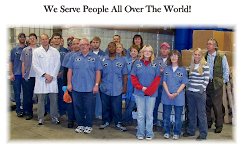Enzymes are lifeless proteins that act as a catalyst for biochemical reactions. When added to cleaning products, enzymes will speed up the degradation of organic wastes. The downside of using a cleaner with only enzymes is that, since they are non-living, they cannot adapt to new or changing environments. Additionally they can not reproduce or repair themselves, making them very fragile. Enzymes are also easily damaged by an extreme pH, temperature change, chemicals coming into contact with them, or even other ENZYMES! Since their number will dwindle over time, this means more maintenance and buying more products.
Stage 1 : An enzymatic cleaner entering your pipes...
Stage 2 : Initial waste degradation is successful......
Stage 3 : Enzymes are almost completely gone.....
Bacteria, on the other hand, are living organisms that use organic wastes, such as fats & oils. as a food source. They seek out this organic matter and digest it into simpler compounds, basically CO2 & water, while, cycling more important nutrients, like nitrogen, phosphorus, & sulfur. Since bacteria are living, they can grow and reproduce rapidly when in the right environment. This environment is crucial to the life and growth of bacteria. In the right conditions bacteria will grow, continuously secreting enzymes specific to the substance they are trying to degrade. With continuous use of biological product, the bacteria will colonize to form what is known as "biofilm". This "biofilm" adheres to surfaces that organic matter clings to, such as pipe walls, building a defense against any future organic build up. All of this results in less maintenance for you and lower costs!
Stage 1 : A enzyme producing bacterial cleaner entering your pipes...
Stage 2 : Environmental conditions are favorable for growth....
Stage 3: Waste is degraded and bacterial colonies start to form...
So What Does ENVIRO-ZYME Use?:
Here at ENVIRO-ZYME, our customers deserve only the best. That's why we use 100% non-pathogenic, bacteria in our products. Through rigorous testing we have concluded that it is only through team work (both bacteria and enzymes together) that organic waste is most efficiently degraded. First the bacteria comes in contact with the food source, then it produces the necessary enzymes to break down the waste into simpler compounds, and finally the bacteria digest these simpler compounds to inert byproducts such as CO2 & water. The best part is that the "biofilm" that grows inside your system from regular use of bacterial products ensures that you will no longer be constantly troubled with costly maintenance procedures and build up.
Enzymes VS. Bacteria...and The Winner is...BOTH


No comments:
Post a Comment